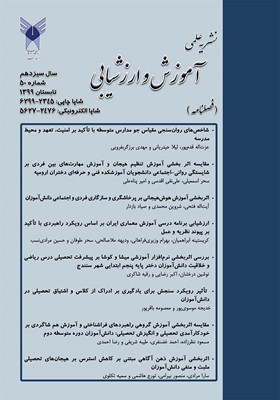اثربخشی آموزش هوشهیجانی بر پرخاشگری و سازگاری فردی و اجتماعی دانشآموزان
محورهای موضوعی : روانشناسی تربیتیآیتاله فتحی 1 , شروین محمدی 2 , صیاد بازدار 3
1 - عضو هیئت علمی پژوهشگاه علوم انتظامی و مطالعات اجتماعی ناجا، تهران، ایران
2 - دکتری روانشناسی سلامت، گروه روانشناسی، دانشکده روانشناسی، واحد کرج، دانشگاه آزاد اسلامی، کرج، ایران
3 - کارشناسارشد روانشناسی بالینی، گروه روانشناسی، دانشکده روانشناسی، واحد تبریز، دانشگاه آزاد اسلامی، تبریز، ایران
کلید واژه: پرخاشگری, سازگاری اجتماعی, آموزش هوش هیجانی, سازگاری فردی,
چکیده مقاله :
هدف از این پژوهش تعیین اثربخشی آموزش هوش هیجانی بر کاهش پرخاشگری و افزایش سازگاری فردی و اجتماعی دانشآموزان پسر پایه پنجم ابتدایی بود. پژوهش حاضر از نوع مطالعات آزمایشی با طرح پیشآزمون- پسآزمون و گروه کنترل بود. جامعه آماری پژوهش شامل کلیه دانشآموزان پسر پنجم ابتدایی شهر تبریز در سال تحصیلی 96-95 بود. از این جامعه نمونهای به حجم 60 نفر به روش نمونهگیری تصادفی خوشهای انتخاب و به تصادف در دو گروه آزمایش (30 نفر) و کنترل (30 نفر) جایگزین شدند. سپس هر دو گروه در مرحله پیش و پسآزمون پرسشنامه پرخاشگری باس و پری و آزمون شخصیت سنج کالیفرنیا را تکمیل، و در این اثناء شرکت کنندگان گروه آزمایش در طی 15 جلسه، 45 دقیقه ای، به مدت 3 روز در هفته (45 روز) در معرض آموزش های هوش هیجانی قرار گرفتند. تجزیه و تحلیل دادهها با استفاده از تحلیل کوواریانس در برنامه spss انجام گرفت. تحلیل دادهها نشان داد که آموزش هوش هیجانی به طور معنیداری منجر به کاهش میانگین نمرات پرخاشگری و افزایش میانگین نمرات سازگاری فردی و اجتماعی در گروه آزمایش نسبت به گروه کنترل شده است. با توجه به نتایج بدست آمده میتوان مطرح کرد که آموزش هوش هیجانی بر پرخاشگری و سازگاری فردی و اجتماعی دانشآموزان مؤثر است.
The purpose of present study is to investigate the Modeling of the Relationship among Student Academic Burnout, Personal and Educational experiences and Avoidance Strategies with the Intermediating Role of Academic Engagement. This research is carried out using correlation method and using structural equation method. The statistical population of the study consisted of all senior students of University of Kashan in 2017-2018 academic year (N=1218). Stratified random sampling was used. The sample size was estimated based on the Krejcie & Morgan formula of 300 (135 males and 165 females). The research tools include the Maslach's Burnout Inventory (Schaufeli et al., 2002), Avoidance Strategies Scale (Turner et al, 2002), Personal and Educational Development Inventory (Lawless & Richardson, 2004), and Academic Engagement Questionnaire (Reeve &Tseng, 2011). The analysis of the findings showed that the conceptual model of research has been appropriately fitted, so that academic burnout directly affects the personal and educational experiences of students and with the intermediating of academic engagement on both internal research variables (personal and educational experiences and reporting avoidance strategies). Student engagement as an intermediating variable has a significant correlation with other two introvert variables in the research domain and the extrovert variable of research (academic burnout), and burnout has reduced the academic engagement of the students. Finally, the results of the study showed that increased academic burnout in students can affect their academic engagement, their experiences during the university and the use of avoidance strategies.
_||_


